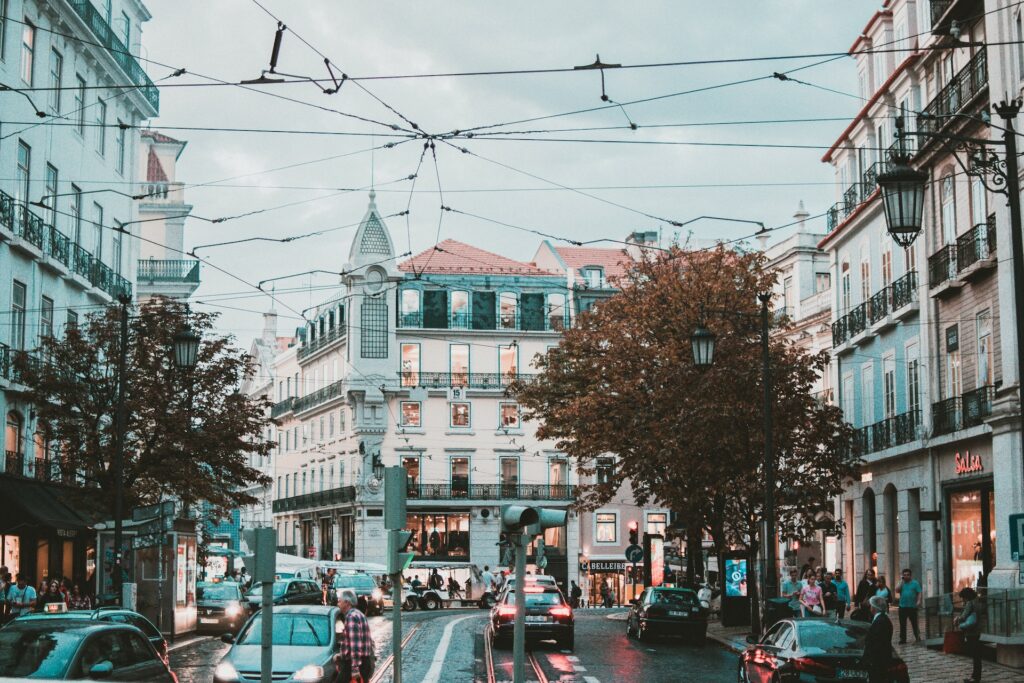Portugal’s allure draws numerous expats in search of its 300 days of sunshine, yet its winters, while not overly cold, offer a pleasantly surprising season of their own.
Winter in Portugal
During the winter months, in Portugal visitors can enjoy an diverse climate that makes it a popular choice for travelers seeking refuge from the weather in other parts of Europe. Along the regions temperatures typically hover around 10°C to 16°C (50°F to 60°F) providing a retreat, from the more severe winters experienced in northern Europe. Despite its nature Portugals winter still has its distinct charm and characteristics.
In the mountains of Portugals Serra da Estrela range lies the only place where significant snowfall occurs in the country. The snowy landscapes transform into a winter wonderland attracting winter sports fans and nature enthusiasts alike.
During December and January, in Portugal usually experience the temperatures of the year when it can get quite chilly with freezing temperatures particularly in the inland and northern areas of the country The Serra da Estrela mountain range is especially enchantingly beautiful, during this time as it gets covered in a thick layer of snow making it a delightful winter getaway spot.
During the winter season, in Portugal it’s important to mention that heavy rainfalls can occur in cities such as Lisbon.This intermittent heavy rain may result in flooding in areas which adds an interesting aspect to the winter experience in Portugal. Travelers should be ready for a blend of cold and, at times weather making the winter season in Portugal full of variety and unexpected moments.

Does it snows in Portugal?
Many expats thinking about relocating to Portugal wonder if they will experience snow there since the country is known for its weather; however snowfall can be seen in some regions of Portugals mountainous areas at times.
If you’ve ever imagined a winter wonderland getaway the Serra da Estrela Mountain, in Portugal provide a retreat. When the snow falls during the winter months the scenery becomes a snowy haven. This location appeals to snow lovers. Provides a winter adventure, in a typically mild climate.
Most parts of Portugal have winters, with minimal to no snowfall – in the coastal and southern regions – so you won’t find yourself needing to clear snow from your doorstep, in this expat friendly country for the most part!

Is the Algarve cold in winter?
The Algarve in the part of Portugal usually has relatively warm winters compared to many other places, in Europe.
The winter weather, in the Algarve may not be as warm as summer. Is generally deemed pleasant by people and isn’t usually described as “cold ” unlike the colder winters, in northern Europe.
In contrast, to daytime warmth the evenings and nights may get cooler; therefore it is recommended to bring layers to ensure comfort once the sun sets.
Is Lisbon cold during winter?
Winters in Lisbon are known for their temperatures which offer a break for people used to colder climates in Northern Europe. During the day the temperature usually ranges from 10°C to 16°C (50°F to 60°F) creating conditions, for adventures and leisurely walks through the citys picturesque streets.
In Lisbons winters are typically mild, with snow or extreme cold temperatures rarely experienced; instead they see heavy rainfall that may cause temporary flooding in low areas but its important to note that these rainy days are infrequent and not a common occurrence during the winter season, in Lisbon.
If you’re thinking about choosing Lisbon as your home and are concerned, about the winter weather being too chilly to handle comfortably. Don’t worry! Lisbon boasts an pleasant winter climate that doesn’t require you to bundle up in layers of winter clothing when exploring its vibrant culture and historical sites.
Warming house in Portugal
Heating your house in Portugal demands planning due, to the cold winters in specific areas of the country.Widespread availability of electricity is key, to powering heating systems throughout Portugal.
Heating systems powered by either electricity or natural gas are widely favored in areas, for their efficiency and convenience in keeping spaces warm, throughout the colder seasons while providing comfort to households throughout Portugal.
Furthermore the countrys dedication, to sustainability has resulted in the rising trend of using panels as an alternative for heating purposes. Portugals plentiful sunlight makes utilizing power an environmentally friendly option, for homeowners.
Solar thermal systems have the ability to warm water, for heating spaces efficiently while also contributing to energy conservation and reducing harm—a movement that mirrors Portugals dedication, to adopting greener and more eco energy alternatives.
In the countryside regions today still carry on the age practice of utilizing fireplaces and wood stoves to keep warm. These traditional ways of heating not just offer heat. Also bring about an atmosphere that makes for a welcoming escape, from chilly weather.

Best things to do in Winter in Portugal
Winter, in Portugal is a time of year offering a range of experiences for both residents and tourists alike. Here are a few suggestions, for things to do during this season;
Experience the art of Fado performances
During a winter season one of the captivating experiences is going to see a Fado show. Known as the music of Portugal Fado captures the emotions and narratives of the nation.
In a setting, with lighting surrounding you at a live performance venue in Lisbon or Coimbra city in Portugal awaits an enchantment as skilled Fado vocalists serenade you with moving tunes and heartfelt lyrics steeped in emotion and culture unique, to the regions musical heritage.
Explore the Christmas market
The winter season, in Portugal is a time of celebration when the whole country lights up with decorations and twinkling lights from November to December.
During the holiday season, in Lisbon and Porto cities in Portugal come alive with Christmas markets offering one of a kind gifts and delicious seasonal delights such as roasted chestnuts and pastries. Take part in the celebrations, with the locals. Make sure not to overlook the mesmerizing light decorations that turn the historic streets of Portugal into magical winter wonderlands.
Join in the festivities of the Carnival
In Portugal, during Februarys Carnival season there is an atmosphere filled with parades and vibrant energy in cities like Loulé and Torres Vedras where extravagant costumes and festive music are, in abundance.
Portugals Carnival offers an memorable experience whether you decide to dress up and be a part of the festivities or simply enjoy the atmosphere as an observer.
Get comfortable next, to the fireplace
During the winter days and nights when the chill creeps in slowly but surely and makes its presence known; there’s truly nothing that compares to snuggling up by a crackling fireplace to ward off the cold and bring comfort and warmth to ones soul. Numerous delightful eateries and cozy lodgings, throughout Portugal provide the setting with their welcoming fireplaces that exude a sense of warmth and coziness; making them spots for an intimate dinner with your significant other or a laid back gathering, with friends to enjoy each others company in a relaxed atmosphere.
It’s an opportunity to enjoy Portugals winter dishes such, as bacalhau (codfish) or a warm bowl of caldo verde (green soup) all, in the cozy glow of a crackling fire.
Lets talk about wine tasting
Winter is a season to delve into the wine culture of Portugal by visiting charming vineyards in areas such, as the Douro Valley and Alentejo or the Setúbal Peninsula, for delightful wine sampling experiences.
Experience a variety of wines on your tasting journey. From the port wine, to other delightful selections Discover the art of winemaking behind each bottle and embrace the distinct flavors that have established Portugal as a haven, for wine enthusiasts.
Discover Charming Towns
During winter, in Portugals quaint villages, like Óbidos and Belmonte reveal an charming ambiance as they adorn themselves with decor for the holidays.
Stroll, along the cobblestone pathways. Marvel at the timeless buildings, around you as you soak in the essence of the communitys traditions and way of life.

Thinking about moving to Portugal?
Portugal Residency Advisors® offers a range of services tailored to assist individuals and families looking to make Portugal their new home providing thorough support throughout the relocation process.
We have a team of professionals and valuable partnerships, with industry experts to help clients through every step of the relocation process. From financial concerns, to logistical arrangements.
Our dedication, to providing top notch service and meticulous care guarantees that our customers will experience support every step of the way on their travels, to Portugal.
Whether you’re seeking residency status or aiming to kickstart a business venture or delve into real estate investments. Rest assured that our team is well equipped with the know how and experience to support you through each phase of the process.
Frequently Asked Questions About Winter in Portugal
How cold does it get during winter in Portugal?
Winter temperatures in Portugal can vary by region. In the northern and central parts of the country, you can expect colder temperatures, often dropping below freezing at night, while in the southern coastal regions, winters tend to be milder, with temperatures rarely falling below freezing.
Are there winter festivals or events in Portugal?
Yes, Portugal has several winter festivals and events. The Christmas season is celebrated with various traditions and festivities throughout the country. Additionally, some regions host special events like holiday markets and music festivals during the winter months.
How can I stay warm in my accommodations during a Portuguese winter?
Most accommodations in Portugal, including hotels and vacation rentals, have heating systems to keep you warm during the winter. Additionally, you can consider staying in accommodations with central heating or wood-burning fireplaces for added comfort.
Are there any specific winter foods or dishes I should try in Portugal?
Yes, Portuguese cuisine offers some delicious winter dishes like “caldo verde” (green soup), “bacalhau com todos” (codfish with vegetables), and various hearty stews. Don’t forget to sample the local wines and traditional pastries like “pastéis de nata.”
Does it snow in Lisbon, Portugal?
Snowfall in Lisbon, Portugal, is an extremely rare occurrence. The city experiences a Mediterranean climate with mild winters, and snow is almost unheard of in Lisbon. If you’re looking for snow in Portugal, you would typically need to travel to higher altitudes in mountainous regions like the Serra da Estrela.
How can I warm my house in Portugal?
You can warm your house in Portugal using various methods, including electric central heating, natural gas central heating, solar panels, or traditional fireplaces and wood stoves, depending on your location and preferences
Is natural gas expensive in Portugal?
Natural gas in Portugal can be relatively expensive compared to other energy sources. This cost factor may influence your decision, particularly if you are looking for a more budget-friendly option.
Where to Find Snow in Portugal?
To find snow in Portugal, head to the Serra da Estrela mountain range in central Portugal during the winter months.




